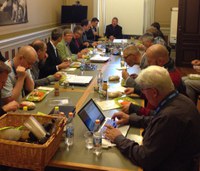Let it grow
On 23–25 September 2014 NORDUnet hosted its 28th NORDUnet Conference in Uppsala, bringing together networking and cloud computing experts and users. NeIC’s Director Gudmund Høst presented the NeIC business model, focusing on the human factor. And precisely in the spirit of enhancing human relations between their organisations, NeIC and NORDUnet met for a working lunch.
Tuesday 23 September, Dr. Høst briefly presented the projects currently being carried out under NeIC, including easy sharing of data (B2Share Nordic), sensitive data (Tryggve), cloud computing for researchers (Glenna), supporting physics at CERN with data processing services, supporting “Nordic” ESFRI projects with e-Infrastructure services and policy support for Nordic stakeholders.
His main point, however, was how to achieve successful e-infrastructure collaboration at the Nordic level. According to Dr. Høst, the success or failure of these efforts lies in the approach – with regard to both the notion of e-infrastructure development and the realisation of virtual teamwork.
e-infrastructures are not built. They are grown
First things first: NeIC’s main goal is to provide added value for researchers across the Nordic countries. Over time, many different e-infrastructures have developed in the different research communities in the different countries, and this continues to be the case today. NeIC works to close gaps and coordinate activities where it makes sense. Projects can be initiated top-down or bottom-up, as new needs emerge. Dr. Høst’s point is that e-infrastructures are not built, since they will never stop developing. Instead they are grown. “We need to foster and encourage e-infrastructure, not build it once and for all”, Dr. Høst stated. The Nordic countries provide a perfect framework for this growth, as the researchers trust not only each other, but also their governments. Providing support for this growth requires flexibility and openness, which form the core of everything NeIC does.
The human factor
A small, decentralised organisational framework facilitates the ability to take quick, targeted action. NeIC consists of just a few employees in Oslo and four coordinators based across the Nordic countries. Virtual teamwork is a must of course, and requires structure and good routines. “The human factor is the basis of all cooperation, and you need soft skills and a focus on people issues to make a virtual team work,” Dr. Høst says, going on to reveal that NeIC employees drink coffee together in front of their computers every Monday morning – what the swedes would call cyber fika – simply to catch up on all the small, important things that are not necessarily data-related. This helps to nourish the soft skills, as did the working lunch with NORDUnet. When participants returned to the conference day they each knew a little bit more about the others, and had moreover enjoyed a quick bite to eat. Had a toast been proposed, it would surely have been to the human factor and the soft issues in this hardware community.

